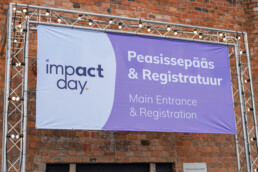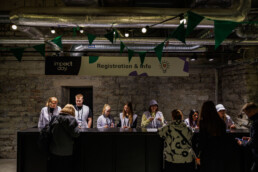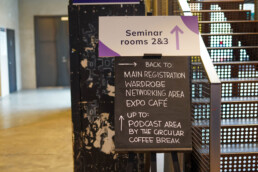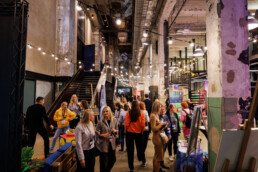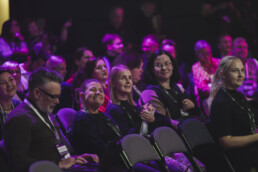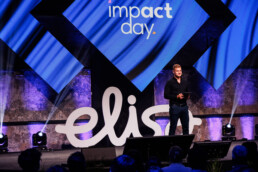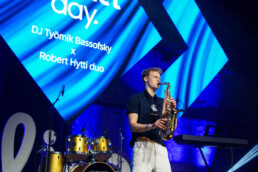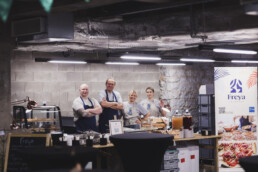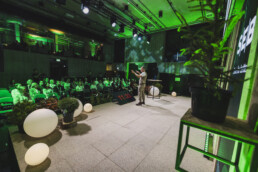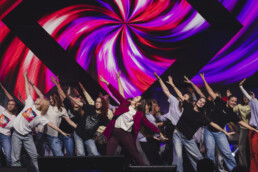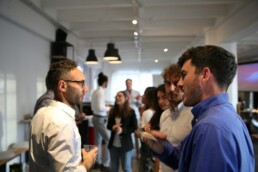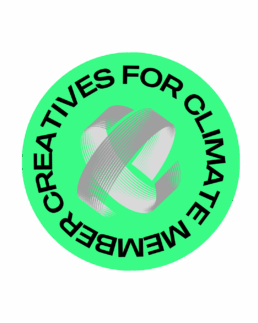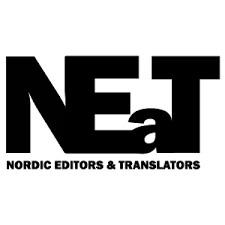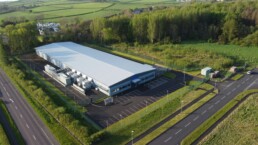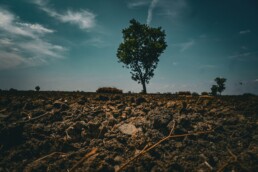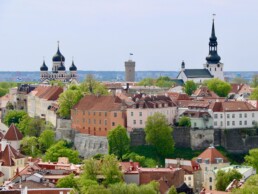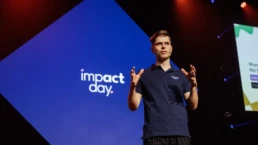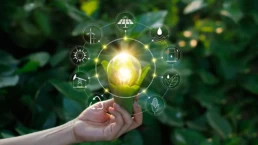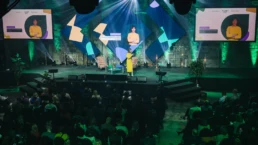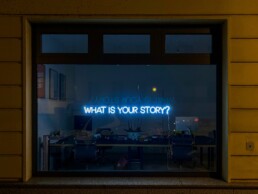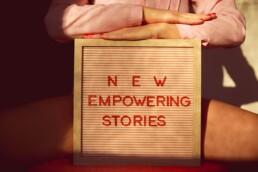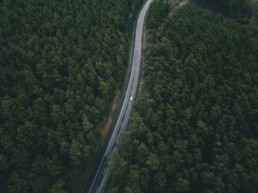Impact Day inspires once again
Administrator1
It has been a few weeks since Impact Day, so it is about time for a recap. This event is always well worth attending and highlights all topics relevant to a sustainable world. The beautiful old capital Tallinn is also a feast for the eyes. Although Estonia has only about 1.3 million inhabitants, Impact Day always has an international allure — not least because of the program with speakers from all over the world. Estonia is also known as one of the most digitally advanced countries, partly because it launched e-Residency in 2014. This allows you to run your business entirely online from anywhere and use all the services you need in Estonia.
Tallinn wants to be a leader in sustainability
It is also progressive in the field of circularity and other sustainability issues and wants to be a leader in this area. In 2023, Tallinn was still European Green Capital. But back to Impact Day, which actually consists of two days. How do you travel to such an event? From my base in Espoo – near Helsinki – in Finland, it’s extremely easy: you just take the boat and within two hours you’re sailing into the port of Tallinn. Although some ships are already equipped with more environmentally friendly technologies, the ecological balance of cruises remains significantly negative. Many shipping companies are working on electrifying their ships step by step, and there are also significant developments in the use of renewable fuels such as biodiesel, biogas, and hydrogen.
Sustainable ships in development
Eckerö Line’s m/s Finlandia, which sails between Helsinki and Tallinn, will be equipped with a battery solution to reduce CO2 emissions in early 2026, making it the first hybrid ship in the Gulf of Finland, although the intended fuel savings are only 3%. Nevertheless, this amounts to approximately 500-600 tons less fuel per year.
Program for the first day
The first day of Impact Day at Kultuurikatel, within walking distance of the port, kicked off with David Armstrong after a beautiful musical intro. He is a motivational speaker from the US and explained that your ‘Why’ must be greater than your ‘Why not’. Why do you get out of bed every day to do what you do? After a life full of struggles, he was able to put his finger on the sore spot like no other. Then it was the turn of Clover Hogan, a well-known Australian climate activist who was physically present last year, but now gave her opinion on the current state of sustainability issues via an online screen. How do you ensure that well-being, prosperity, and the environment go hand in hand? Which was basically the theme of the entire event: Building an Ambitious and Self-Sufficient Europe. One of the main organizers, Samuel Põldaru, smoothly tied everything together. And, just like last year, food and drinks were well taken care of.
Versatile topics
The rest of the day, various other interesting topics were discussed on the three stages — Impact Stage, Sustainability Stage, and Inspiration Stage — including reducing textile waste, the power of circularity, designing green cities, and reducing food waste. Although his advanced age (80) sometimes made him difficult to understand, the well-known Estonian zoologist and ethologist Aleksei Turovski stood out for me. His story, entitled ‘Animals Don’t Work for the Market. Are They Doomed?‘ was about the successful sustainable development of animal populations, which is inevitably linked to Shelford’s law: animals use resources and services in ecosystems on an optimal basis, not on a maximum basis.
This results in ecosystems that create a surplus — that is, more resources than the systems themselves need to thrive. This surplus is, for example, the thick layer of humus in the soil, the abundant oxygen in the air, and the peat in the swamp. It is what we humans have mistakenly come to take for granted and use at our own discretion. In reality, it is the only guarantee for the survival of biodiversity on earth. In light of current climate change, with countless animal species and entire coral reefs threatened with extinction, this is one of the most sensitive issues.
The day was concluded by Seth Godin, multiple bestselling author and marketing guru. He emphasized the importance of collaboration, local initiatives, and, last but not least, consistency. When you do things you truly believe in, something beautiful can emerge.
Program for day two
The second day began, once again, with beautiful musical accompaniment and a keynote speech by Gunter Pauli, a pioneer who is also known as the “Steve Jobs of sustainability”. He founded Zero Emissions Research and Initiatives (ZERI) in 1994 and is the author of The Blue Economy. He has also published 20 books in more than 30 languages and 365 fables: inspiring stories that introduce children to science and emotional intelligence. His story focused primarily on innovations and inspiration: there are now many more advanced methods and techniques available than wind and solar energy. And they are also cheaper, such as using ocean waves. This second day was also filled with interesting sessions: topics included food systems, the true value of sustainability, raw material use, the impact of AI, and growing with integrity. The latter is also the theme for next year: the new ROI, or Return on Integrity. That is exactly what is needed right now for the shift to a truly more sustainable world.
📷 The photos were taken by Laura Luga, Rasmus Kooskora, and Silver Gutmann.
ℹ️ Sustainability Content Agency is an ambassador of Impact Day and writes, edits, translates, and advises on sustainability, social impact, and health in almost all European languages. Contact us for more information or book a short call via Calendly.
Impact Day 2025 wederom inspirerend
Administrator1
Het is al een paar weken na Impact Day, dus de hoogste tijd voor een terugblik. Dit evenement is altijd zeer de moeite waard om te bezoeken en belicht alle onderwerpen die relevant zijn voor een duurzame wereld. Ook de prachtige oude hoofdstad Tallinn is een lust voor het oog. Hoewel Estland maar zo’n 1,3 miljoen inwoners telt, heeft Impact Day altijd een internationale allure – niet in het minst door het programma met sprekers van over de hele wereld. Estland staat bovendien bekend als een van de meest digitaal geavanceerde landen, mede doordat ze in 2014 de zogeheten e-Residency lanceerden. Je kunt hierbij volledig online van welke plek dan ook je bedrijf runnen en gebruikmaken van alle diensten in Estland die je daarvoor nodig hebt.
Tallinn wil qua duurzaamheid vooroplopen
Ook op het gebied van circulariteit en andere duurzame onderwerpen is het vooruitstrevend en wil het vooroplopen. In 2023 was Tallinn nog European Green Capital. Maar terug naar Impact Day, wat overigens uit twee dagen bestaat. Hoe reis je naar zo’n evenement? Vanuit mijn standplaats Espoo – vlak bij Helsinki – in Finland gaat dat uiterst eenvoudig: je neemt gewoon de boot en binnen twee uur vaar je de haven van Tallinn binnen. Hoewel sommige schepen al zijn uitgerust met milieuvriendelijkere technologieën, blijft de ecobalans van cruises flink negatief. Veel rederijen zijn bezig met het stap voor stap elektrificeren van de schepen, en er zijn ook aanzienlijke ontwikkelingen in het gebruiken van hernieuwbare brandstoffen als biodiesel en -gas en waterstof.
Duurzame schepen in ontwikkeling
De m/s Finlandia van Eckerö Line die tussen Helsinki en Tallinn vaart, zal begin 2026 worden uitgerust met een batterijoplossing om de CO2-uitstoot te verminderen: het wordt hierdoor het eerste hybride schip in de Finse Golf, hoewel de beoogde brandstofbesparing maar 3% bedraagt. Toch komt dit neer op ongeveer 500-600 ton minder brandstof per jaar.
Programma van eerste dag
De eerste dag van Impact Day in Kultuurikatel, op loopafstand van de haven, werd na een prachtig muzikaal intro afgetrapt door de Amerikaan David Armstrong. Hij is een motivational speaker en legde uit dat je ‘Why’ groter moet zijn dan je ‘Why not’. Waarom stap je elke dag je bed uit om te doen wat je doet? Na een leven vol met struggles kon hij de vinger als geen ander op de zere plek leggen. Daarna was het de beurt aan Clover Hogan, een bekende Australische klimaatactiviste die vorig jaar nog fysiek aanwezig was, maar nu via een online scherm haar mening gaf over de huidige stand van duurzaamheidszaken. Hoe zorg je ervoor dat welzijn, welvaart en het milieu hand in hand gaan? Wat feitelijk het thema van het hele evenement was: Building an Ambitious and Self-Sufficient Europe. Een van de hoofdorganisators, Samuel Põldaru, praatte het geheel soepel aan elkaar. En ook voor eten en drinken was, net als vorig jaar, goed gezorgd.
Veelzijdige onderwerpen
De rest van de dag werden er op de drie podia Impact Stage, Sustainability Stage en Inspiration Stage diverse andere interessante onderwerpen besproken, waaronder het verminderen van textielafval, de kracht van circulariteit, het vormgeven van groene steden en het verminderen van voedselafval. Ondanks dat hij door zijn 80 jaar af en toe lastig te verstaan was, sprong de in Estland bekende zoöloog en etholoog Aleksei Turovski er voor mij uit. Zijn verhaal met de titel ‘Animals Don’t Work for the Market. Are They Doomed?’ ging over een succesvolle duurzame ontwikkeling van dierenpopulaties, wat onvermijdelijk samenhangt met de wet van Shelford: dieren gebruiken hulpbronnen en diensten in ecosystemen op een optimale basis, niet op maximale basis.
Dit resulteert in ecosystemen die een overschot creëren – dus meer hulpbronnen dan de systemen zelf nodig hebben om te gedijen. Dit overschot is bijvoorbeeld de dikke laag humus in de bodem, de overvloedige zuurstof in de lucht en het veen in het moeras. Het is wat wij mensen ten onrechte als vanzelfsprekend zijn gaan beschouwen en naar eigen goeddunken gebruiken. In werkelijkheid is het de enige garantie voor het voortbestaan van de biodiversiteit op aarde. In het licht van de huidige klimaatveranderingen, met ontelbare diersoorten en hele koraalriffen die met uitsterven worden bedreigd, een van de meest heikele onderwerpen.
De dag werd afgesloten door Seth Godin, meervoudig bestsellerauteur en marketing-goeroe. Hij benadrukte het belang van samenwerking, plaatselijke initiatieven en niet op de laatste plaats consistentie. Als je dingen doet waar je echt achter staat, kan er iets moois ontstaan.
Programma van dag twee
De tweede dag begon na wederom een beeldschone muzikale omlijsting met een keynote van Gunter Pauli, een pionier die ook wel de ‘Steve Jobs van duurzaamheid’ wordt genoemd. Hij richtte in 1994 al Zero Emissions Research and Initiatives (ZERI) op en is auteur van The Blue Economy. Daarnaast heeft hij 20 boeken gepubliceerd, in meer dan 30 talen, en 365 fabels: inspirerende verhalen die kinderen kennis laten maken met wetenschap en emotionele intelligentie. Zijn verhaal was vooral gericht op innovaties en inspirerend: er zijn tegenwoordig veel meer geavanceerde methoden en technieken voor handen dan wind- en zonne-energie. En bovendien goedkoper, zoals het gebruikmaken van golven in oceanen. Ook deze tweede dag zal weer vol met interessante sessies: er werd onder andere gesproken over voedselsystemen, de echte waarde van duurzaamheid, grondstoffengebruik, de impact van AI en groeien met integriteit. Dat laatste vormt ook gelijk het thema voor volgend jaar: het nieuwe ROI, oftewel Return on Integrity. Dat is precies wat er momenteel nodig is voor de shift naar een écht meer duurzame wereld.
📷 De foto’s zijn gemaakt door Laura Luga, Rasmus Kooskora en Silver Gutmann.
ℹ️ Sustainability Content Agency is ambassadeur van Impact Day en schrijft, redigeert, vertaalt en adviseert over duurzaamheid, sociale impact en gezondheid in bijna alle Europese talen. Neem contact op voor meer informatie of boek een korte call via Calendly.
Memberships and network organizations
Administrator1
Sustainability Content Agency mainly focuses on organizations that are active in the fields of sustainability, social impact and health. Why this focus? The answer is actually quite simple: because these are important issues.
The world is currently undergoing a transition in many areas: think of the climate crisis, gender issues and the mounting problems in healthcare, including staff shortages and higher costs. As a journalist and founder of SCA, I have interviewed countless people in these sectors, which has convinced me even more to focus this new initiative on these topics in particular.
Connection with themes
But my connection to these issues goes back much further. Back in 2015, MdR Text Bureau, the legal entity of SCA and active since 2008 primarily in the translation sector, became a member of the International Association of Professional Translators and Interpreters (IAPTI). This is an organisation for translators and interpreters that aims to promote ethical practices in the sector. Over the years, I have seen, as in many other sectors, that the emphasis is increasingly on production. Freelancers are simply being pressured to work at ever lower rates – which is, of course, not a new phenomenon.
But the blame cannot always be placed on the agencies that want to maintain their margins. You also have to look at multinationals which, despite making huge profits, want to get the best deal possible. This actually touches on issues such as sustainability, social impact and health. And, not unimportantly, quality also suffers: the emphasis on production leads to shoddy work and leaves little room for job satisfaction.
Sustainability Content Agency wants to do things differently, without being naive. By that I mean that we are happy to participate and listen to our clients’ wishes, but we don’t want to be competitive at all costs. So if a client only looks at the price and doesn’t value the expertise we have in the above-mentioned areas, then that’s a no-go. Moreover, the rates charged by linguists, translators and creators are simply respected.
Making positive change possible
In addition, SCA will not draw such a strict line between clients if they are not yet fully sustainable. It is important to get things moving in a positive direction and to support noble initiatives. That is the only way to move forward. And that is exactly what we stand for: putting sustainable companies and actions in the spotlight. Without resorting to greenwashing. The best way is often not to shout it from the rooftops, but to make consistent improvements and integrate them into policy. SCA can also be of strategic value here and provide valuable input on substantive issues.
Network organization for sustainable impact
Creatives for Climate is another non-profit organization of which SCA is a member. They form a global ecosystem for non-profit creatives. They are supported by, among others, the European Union, the Power Europe Narrative for Civic Ecology (PENCE) initiative and GreenFutures. All of these institutions want to accelerate the ecological transition in Europe by supporting professionals from the creative sector and harnessing their creativity for climate solutions.
Their main goal is to ensure that the truth is told, stories are put into the right context and systemic change is brought about. They unite more than 7,000 professionals in over 90 countries, have an association of ethical agencies and are a rapidly growing network of individuals and brands committed to the climate.
Language workshops, seminars and events
And last but not least: from a linguistic point of view, SCA is a member of Nordic Editors and Translators. NEaT is an association that offers courses, professional development and a network for editors and translators working with the English language in the Nordic countries. What I like about this organization is that they are not overly concerned with trends and really want to focus on the language sector and related subjects. It’s a bit old-school, but with a sideways glance at innovations and technological developments that are taking place. Their workshops and seminars are therefore really worthwhile.
Sustainability Content Agency writes, edits, translates and advises on sustainability, social impact and health in almost all European languages. Please get in touch if you want to know more. You can also book a quick call via Calendly.
Lidmaatschappen en netwerkorganisaties
Administrator1
Sustainability Content Agency is dus voornamelijk gericht op organisaties die actief zijn op het gebied van duurzaamheid, sociale impact en gezondheid. Waarom eigenlijk deze focus? Het antwoord is heel simpel: omdat het belangrijke onderwerpen zijn.
De wereld bevindt zich op dit moment op vele gebieden in een transitie: denk aan de klimaatcrisis, genderkwesties en de zich opstapelende problemen in de gezondheidszorg, waaronder personeelstekorten en hogere kosten. Als journalist heb ik als oprichter van SCA ontelbare mensen in deze sectoren geïnterviewd, wat mij nog meer heeft overtuigd om dit nieuwe initiatief vooral op deze onderwerpen te richten.
Verbondenheid met thema’s
Maar de verbondenheid met deze kwesties gaat veel verder terug. Al in 2015 werd MdR Text Bureau, de juridische entiteit van SCA en sinds 2008 actief in met name de vertaalsector, lid van de International Association of Professional Translators and Interpreters (IAPTI). Dit is een organisatie voor vertalers en tolken die ethische praktijken in de sector wil bevorderen. In de loop der jaren heb ik gezien, net als in vele andere sectoren, dat de nadruk steeds meer op productie komt te liggen. Freelancers worden simpelweg onder druk gezet om tegen steeds lagere tarieven te werken – natuurlijk geen nieuw fenomeen.
Maar de schuld kan niet altijd worden gelegd bij de bureaus die hun marges willen behouden. Je moet ook kijken naar multinationals die, ondanks dat ze gigantische winst maken, voor een dubbeltje op de eerste rang willen zitten. Dit raakt eigenlijk tegelijkertijd allemaal aan onderwerpen als duurzaamheid, sociale impact en gezondheid. En niet onbelangrijk is dat de kwaliteit er ook onder te lijden heeft: de nadruk op productie zorgt voor afraffelwerk en geeft weinig ruimte voor werkplezier.
Sustainability Content Agency wil dit anders doen, zonder naïef te zijn. Met dat laatste bedoel ik dat we graag meedoen en naar de wensen van klanten luisteren, maar niet ten koste van alles competitief willen zijn. Dus als een klant alleen maar naar de prijs kijkt, en geen waarde hecht aan de expertise die we in bovengenoemde onderwerpen hebben, dan is dat een no-go. De tarieven van linguïsten, vertalers en creators worden bovendien simpelweg gerespecteerd.
Positieve veranderingen teweegbrengen
Daarnaast zal SCA de scheidslijn tussen klanten ook niet zo streng trekken, dat bedrijven die nog niet volledig duurzaam zijn gelijk worden afgewezen. Het is belangrijk om dingen ten positieve in beweging te krijgen, en nobele initiatieven te ondersteunen. Alleen zo komen we vooruit. En dat is precies waar we voor staan: duurzame bedrijven en acties beter onder het voetlicht brengen. Zonder aan greenwashing te doen. De beste manier is vaak niet door het van de daken te schreeuwen, maar om consistent verbeteringen aan te brengen en deze te integreren in het beleid. SCA kan hierbij ook strategisch van waarde zijn en waardevolle input leveren rondom inhoudelijke zaken.
Netwerkorganisatie voor duurzame impact
Creatives for Climate is een andere non-profitorganisatie waar SCA lid van is. Zij vormen een wereldwijd ecosysteem voor creatievelingen zonder winstoogmerk. Ze worden onder andere ondersteund door de Europese Unie, het initiatief Power Europe Narrative for Civic Ecology (PENCE) en GreenFutures. Allemaal instellingen die de ecologische transitie in Europa willen versnellen door professionals uit de creatieve sector te ondersteunen en hun creativiteit in te zetten voor klimaatoplossingen.
Hun voornaamste doel is dat de waarheid wordt gesproken, verhalen in de juiste context worden gegoten en systematische verandering mogelijk wordt gemaakt. Ze verenigen meer dan 7.000 professionals in meer dan 90 landen, hebben een vereniging van ethische bureaus en zijn een snelgroeiend netwerk van individuen en merken die zich inzetten voor het klimaat.
Taalworkshops, -seminars en -evenementen
En last but not least: vanuit linguïstisch oogpunt is SCA lid van Nordic Editors and Translators. De Nordic Editors and Translators Organization (NEaT) is een vereniging die cursussen, professionele ontwikkeling en een netwerk biedt voor redacteuren en vertalers die in de Noordse landen met de Engelse taal werken. Het leuke van deze organisatie vind ik dat ze zich niet enorm bezighouden met trends en echt inhoudelijk bezig willen houden met de taalsector. Het is een beetje old-school, maar met een zijdelingse blik op innovaties en technologische ontwikkelingen die plaatsvinden. Hun workshops, seminars en evenementen zijn daarom echt de moeite waard.
Sustainability Content Agency schrijft, redigeert, vertaalt en adviseert over duurzaamheid, sociale impact en gezondheid in bijna alle Europese talen. Neem contact op voor meer informatie of boek een korte call via Calendly.
What is the real impact of AI?
Administrator1
Artificial intelligence (AI) has become ubiquitous, with its potential seemingly limitless. Almost everyone has experience with it by now and has formed an opinion — whether at the kitchen table or at work. In just a few years, we’ve witnessed a full-blown AI revolution, one that shows no signs of slowing down. But what will remain of it in the future? How efficient are these calculation models and tools, really? What do they ultimately deliver? And most importantly, what is AI’s environmental impact?
Bubble or not?
A recent article on nos.nl (the only Dutch source in this article) questions the actual value of AI and suggests we may be on the verge of a bubble bursting and a new economic crisis:
“The growth of large tech companies continues unabated. Companies that have shifted their focus to AI in recent years are experiencing a golden age. Companies such as Microsoft, Google, and Nvidia are performing exceptionally well on the stock market.”
The AI market is booming
The figures are staggering: Nvidia’s market value has increased tenfold in less than three years, rising from over $400 billion to $4 trillion. The five largest American tech companies are now even bigger than the combined economies of the Netherlands, Germany, France, the UK, Italy, and Spain.
Massive investments in AI development are also transforming the global landscape. Gigantic data centers are being built worldwide — I drove past one near my home yesterday. Nature, of course, pays the price: entire sections of forest often disappear to make way for these facilities.
Jelle Zuidema, associate professor of explainable AI at the University of Amsterdam, notes in the same NOS article that more and more experts are questioning whether AI will quickly lead to increased productivity and significant cost savings.
But shouldn’t the discussion focus more on AI’s impact on the climate? Aren’t we repeating the same pattern as modern societies — prioritizing economic growth while the world literally burns and climatologists sound the alarm?
AI models have enormous emissions
Plan B Eco, a Polish startup focused on sustainable living and planetary protection, highlights the issue in an extensive article: global data centers account for 2.5% to 3.7% (source: 8 Billion Trees) of worldwide greenhouse gas emissions — more than the aviation industry. Training a single large AI model can emit around 300 tons of CO₂.
Each ChatGPT search consumes nearly 10 times the electricity of a typical Google search, often powered by fossil fuels like coal and gas — the primary drivers of climate change. That’s not what we signed up for.
And we haven’t even discussed water consumption. Dr. Camilla Pang has investigated this issue and discovered GreenPT, a Dutch AI tool aiming to compete with ChatGPT and Mistral in a sustainable way. Major media outlets, including The Guardian, have also covered this topic.
Beyond CO₂ emissions and water use, we must consider the rare earth metals mined for AI production — and the often low-paid workers who sustain these unsustainable practices.
How much water is actually consumed?
According to a study by the University of California, every time you run an artificial ChatGPT query, you consume an increasingly scarce resource: fresh water. For every 20 to 50 queries, approximately half a liter of water is lost from our overburdened reservoirs in the form of steam emissions. Data centers consume water by using electricity from steam power plants and by operating cooling systems to keep their servers at safe temperatures. In the U.S. alone, Google’s data centers are estimated to have used 12.7 billion liters of water in 2021 for cooling.
According to the article, a two-week training session for the GPT-3 AI program in Microsoft’s state-of-the-art U.S. data centers consumed approximately 700,000 liters of fresh water — almost as much as the production of about 370 BMW cars or 320 Tesla electric vehicles. Consumption would have tripled if the training had been carried out in Microsoft’s data centers in Asia, which are less efficient.
The university researchers therefore argue that large technology companies must take responsibility and set an example by reducing their water consumption. “It is truly crucial to expose and address the hidden water footprint of AI models, given the increasingly serious crisis of freshwater shortages, prolonged droughts, and rapidly aging public water infrastructure,” according to the article titled “Making AI Less Thirsty”.
GreenPT as a Sustainable Alternative
Fortunately, some companies recognize the importance of this issue and are committed to minimizing the environmental impact of their AI models. While ChatGPT lacks a proactive sustainability policy, Mistral AI takes measurable steps through life-cycle data, open reporting, efficiency guidelines, sustainable hardware, and strategic partnerships.
Then there’s GreenPT, a true game-changer, alongside its equally sustainable data center partner, Leafcloud. Unlike traditional providers, Leafcloud has designed a digital infrastructure that works with — rather than against — the environment. As Dr. Camilla Pang notes in her article, they offer a bold vision for powering future cities.
How do they do it? By reusing energy — capturing heat from data centers to warm communal swimming pools, showers, and buildings. Brilliant, right? We need more of this — and greater transparency — so consumers and businesses can make informed choices.
Quality of AI Tools
How do these chat tools compare? I tested all three for text-related advice, error correction, and topic-based queries. None are perfect: none caught the spelling error “financieën” in my native language, Dutch. When I asked for verification, ChatGPT and GreenPT confirmed it was indeed incorrect, while Mistral still claimed it was correct — so it didn’t recognize the word itself.
Beyond that, the differences are minor. Mistral excels at stylistic suggestions, while ChatGPT and GreenPT proactively offer follow-up recommendations and additional sources — without needing specific prompts.
GreenPT: The Most Sustainable Choice
Currently, GreenPT operates on a subscription model, with the cheapest plan at €4.50/month for 15 daily prompts — ideal for personal or moderate workplace use. Their business subscriptions remain affordable, but paying for sustainability feels counterintuitive. Ideally, these companies should receive government and financial support to operate for free — as the world doesn’t have time to wait. For now, though, we must work with what we have.
Sources:
NOS article (in Dutch): https://nos.nl/artikel/2586573-is-de-euforie-rond-ai-een-bubbel-die-op-knappen-staat
Arxiv: https://arxiv.org/pdf/1906.02243
The Guardian: https://www.theguardian.com/commentisfree/article/2024/may/30/ugly-truth-ai-chatgpt-guzzling-resources-environmentgreenpt
Goldman Sachs: https://www.goldmansachs.com/insights/articles/AI-poised-to-drive-160-increase-in-power-demand
Dr Camilla Pang: https://camillapang.substack.com/p/my-experience-with-greenpt
University of California: https://news.ucr.edu/articles/2023/04/28/ai-programs-consume-large-volumes-scarce-water
Sustainability Content Agency writes, edits, and translates content on sustainability, social impact, and health in almost all European languages.
Wat is de echte impact van AI?
Administrator1
Het gebruik van kunstmatige intelligentie (AI) is inmiddels gemeengoed geworden in de wereld, waarbij de bomen tot de hemel lijken te groeien. Bijna iedereen heeft er inmiddels ervaring mee en vormt een mening erover, of dat nu aan de keukentafel is of op het werk. In een paar jaar tijd is er sprake geweest van een heuse AI-revolutie, die voorlopig nog niet aan haar einde is gekomen. Maar wat blijft daar straks daadwerkelijk van over? Hoe efficiënt zijn al die rekenmodellen en tools nou echt? En wat leveren ze uiteindelijk op? En nog belangrijker: welke impact op het milieu heeft de technologie?
Bubbel of niet?
In een recent artikel op nos.nl wordt de daadwerkelijke waarde in twijfel getrokken en geopperd dat we misschien wel aan de vooravond staan van het knappen van de bubbel en een (nieuwe) economische crisis: ‘De groei van grote techbedrijven houdt niet op. Vooral bedrijven die afgelopen jaren de focus hebben verlegd naar AI beleven gouden tijden. Bedrijven als Microsoft, Google en Nvidia doen het ongekend goed op de beurs.’
AI-markt is echt booming
Ze komen met onvoorstelbare cijfers: ‘De marktwaarde van chipmaker Nvidia is in minder dan drie jaar maar liefst tien keer zoveel waard geworden en gestegen van ruim 400 miljard dollar naar 4000 miljard. De vijf grootste Amerikaanse techbedrijven zijn inmiddels zelfs groter dan de economieën van Nederland, Duitsland, Frankrijk, het VK, Italië en Spanje bij elkaar.’
De bedragen die in de ontwikkeling van AI worden gepompt, zijn ook onvoorstelbaar. Ook worden er op verschillende plekken in de wereld gigantische datacenters gebouwd, ik reed er gisteren nog langs eentje bij mij in de buurt. De natuur is hierbij natuurlijk de klos: vaak verdwijnen hierdoor hele stukken bos.
Jelle Zuidema, universitair hoofddocent explainable AI aan de Universiteit van Amsterdam, vertelt in hetzelfde NOS-artikel dat steeds meer experts twijfelen aan het idee dat AI snel zal leiden tot meer productiviteit en grote kostenbesparingen.
Maar zou de discussie ook niet veel meer moeten aan over de impact van AI op het klimaat? Doen we nu niet hetzelfde wat we altijd hebben gedaan in moderne samenlevingen: ons alleen richten op economische groei, terwijl de wereld regelmatig letterlijk in brand staat en klimatologen continu de noodklok luiden?
AI-modellen hebben een enorme uitstoot
Plan Be Eco, een Poolse start-up die zich specifiek richt op een milieuvriendelijke levensstijl en bescherming van de planeet, heeft hier een uitgebreid artikel over geschreven: energieverbruik van datacenters is wereldwijd verantwoordelijk voor 2,5% tot 3,7% (bron: 8 Billion Trees) van de wereldwijde uitstoot van broeikasgassen, meer dan de luchtvaartindustrie. Naar schatting kan het trainen van een groot AI-model leiden tot een uitstoot van ongeveer 300 ton CO2.
Elke ChatGPT-zoekopdracht verbruikt bijna 10 keer zoveel elektriciteit als een typische Google-zoekopdracht, stroom die vaak afkomstig is van het verbranden van fossiele brandstoffen als kolen en gas: de belangrijkste oorzaken van klimaatverandering.
En dan hebben we het nog niet eens gehad over het waterverbruik. Dr Camilla Pang heeft dat wel gedaan, en is persoonlijk op onderzoek uitgegaan. Ze kwam daarbij GreenPT op het spoor: een nieuwe Nederlandse AI-tool die op een duurzame manier de strijd wil aangaan met ChatGPT en Mistral. Maar natuurlijk besteden ook grote media hier af en toe aandacht aan, waaronder The Guardian.
Naast de CO2-uitstoot en het waterverbruik moet je ook de zeldzame aardmetalen benoemen die worden gewonnen voor de productie ervan. En niet te vergeten de vaak laagbetaalde arbeiders die langdurig worden ingehuurd, want niet-duurzame praktijken bevatten vaak ook een niet-sociale component.
Hoe groot is dat waterverbruik precies?
Volgens een onderzoek van de University of California verbruik je elke keer dat je een kunstmatige ChatGPT-query uitvoert, een steeds schaarser wordende hulpbron: zoet water. Voor zo’n 20 tot 50 query’s gaat in de vorm van stoomuitstoot ongeveer een halve liter aan water uit onze overbelaste reservoirs verloren. Datacenters verbruiken water door elektriciteit te gebruiken van stoomcentrales en door koelmachines om hun servers koel te houden. Alleen al in de VS verbruikten de datacenters van Google in 2021 naar schatting 12,7 miljard liter water om hun servers koel te houden.
Zo verbruikte volgens het artikel een training van ongeveer twee weken voor het GPT-3 AI-programma in de ultramoderne datacenters van Microsoft in de VS ongeveer 700.000 liter zoet water, wat bijna evenveel is als de productie van circa 370 BMW-auto’s of 320 Tesla-elektrische voertuigen. Het verbruik zou zelfs verdrievoudigd zijn als de training was uitgevoerd in de datacenters van Microsoft in Azië, die minder efficiënt zijn.
De onderzoekers van de universiteit stellen dan ook terecht dat grote technologiebedrijven hun verantwoordelijkheid moeten nemen en het goede voorbeeld moeten geven om hun waterverbruik te verminderen. “Het is echt cruciaal om de geheime watervoetafdruk van AI-modellen bloot te leggen en aan te pakken, vanwege de steeds ernstiger wordende crisis van zoetwatertekorten, langdurige droogtes en snel verouderende openbare waterinfrastructuur”, aldus het artikel getiteld ‘AI minder ‘dorstig’ maken’.
GreenPT als duurzaam alternatief
Gelukkig zijn er wel degelijk bedrijven die wel het belang inzien en de impact van hun AI-modellen echt willen beperken. Waar ChatGPT vooralsnog geen proactief beleid voert op dit gebied, zet Mistral AI zich bijvoorbeeld hiervoor in door meetbare levenscyclusdata, open rapportages, efficiëntie‑richtlijnen, duurzame hardware en strategische partnerschappen.
En dan is er natuurlijk een alternatief dat echt zoden aan de dijk zet: GreenPT en hun net zo duurzame datacenterpartner Leafcloud. Deze laatste heeft een digitale infrastructuur ontworpen die met het milieu meewerkt, in plaats van ertegenin te gaan. Ze zijn niet alleen een technologiebedrijf, maar hebben eveneens een nieuwe visie op hoe we de steden van de toekomst van energie voorzien, zo vertelt mevrouw Pang ook in haar online artikel.
Hoe doen ze dat? Ze hergebruiken onder andere energie door de warmte van datacenters op te vangen en deze te gebruiken voor het verwarmen van gemeenschappelijke zwembaden, douches en gebouwen. Briljant toch? Graag meer van dit, en meer zichtbaarheid. Zodat consumenten en bedrijven weten wat er werkelijk speelt.
Kwaliteit van AI-tools
Hoe zit het eigenlijk met de kwaliteit van deze chat-tools? Ik heb ze inmiddels alle drie geprobeerd voor tekstgerelateerd advies en feedback over bepaalde grote fouten in teksten die ik gefabriceerd heb. En ook voor prompts waarin ik vroeg naar informatie over bepaalde thema’s. Perfect zijn ze natuurlijk niet. Zo filterden geen van deze drie de spelfout ‘financieën’ eruit. Toen ik vervolgens vroeg of dit wel echt zo geschreven wordt, antwoordden zowel ChatGPT als GreenPT dat dit inderdaad foutief was. Mistral beweerde nog steeds dat het correct was, maar kwam daarbij bevestigend met ‘financiën’ op de proppen, dus het model herkende het woord feitelijk niet. Verder is er naar mijn idee niet heel veel verschil. Mistral komt net zo goed met goede suggesties voor verbeteringen in de stijl. ChatGPT en GreenPT geven zonder specifieke prompts goede suggesties voor opvolging en extra bronnen, waar Mistral dit meestal achterwege laat.
GreenPT meest duurzame oplossing
GreenPT werkt op dit moment overigens alleen met abonnementen, waarbij het goedkoopste € 4,50 per maand kost. Daar krijg je 15 prompts per dag voor. Dit zal voor de meeste mensen voldoende zijn als huis-tuin-en-keuken-gebruik of een handige assistent op het werk. Hun zakelijke abonnementen zijn nog steeds zeer betaalbaar. Maar betalen om de wereld een beetje te helpen? Dat is waar het vaak een beetje krom is. Dit soort bedrijven moeten natuurlijk alle noodzakelijk support uit duurzame financiële ecosystemen en van de overheid krijgen, zodat ze gratis zijn. Er is eigenlijk geen tijd te verliezen. Maar voorlopig moeten we het ermee doen.
Bronnen:
NOS-artikel: https://nos.nl/artikel/2586573-is-de-euforie-rond-ai-een-bubbel-die-op-knappen-staat
Arxiv: https://arxiv.org/pdf/1906.02243
The Guardian: https://www.theguardian.com/commentisfree/article/2024/may/30/ugly-truth-ai-chatgpt-guzzling-resources-environmentgreenpt
Goldman Sachs: https://www.goldmansachs.com/insights/articles/AI-poised-to-drive-160-increase-in-power-demand
Dr Camilla Pang: https://camillapang.substack.com/p/my-experience-with-greenpt
University of California: https://news.ucr.edu/articles/2023/04/28/ai-programs-consume-large-volumes-scarce-water
Sustainability Content Agency schrijft, redigeert en vertaalt over duurzaamheid, sociale impact en gezondheid in bijna alle Europese talen.
Soon: Impact Day 2025 in Tallinn
Administrator1
On 9 and 10 October, it’s time again for Impact Day in the beautiful old city of Tallinn in Estonia. If you want to try something different, gain inspiration and discover a new city, this is the perfect opportunity.
No topic related to sustainability will be left untouched, including cleantech, nature, the food industry, mobility/transport, construction and social entrepreneurship. You can listen to renowned speakers such as entrepreneur and best-selling author Seth Godin, climate activist Clover Hogan (who was also present last year), author and non-profit entrepreneur (Sensei) David Armstrong and many others.
This year’s theme: Building a bold, self-sufficient Europe.
Impact Day is the largest event of its kind in Northern Europe and focuses primarily on promoting social, responsible and environmentally friendly business practices, where well-being and prosperity go hand in hand.
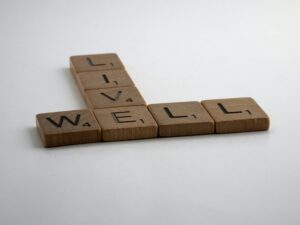
The world is going through a period of instability and change, which is accompanied by all kinds of uncertainties. Geopolitical tensions also necessitate a more self-sufficient and sustainable European continent. At this event, you can connect with leaders, innovators and policymakers committed to positive, sustainable action. You can enjoy more than 80 sessions, including keynotes, practical workshops, discussion panels as well as a pitch competition.
The big question here is: how can we turn the current global security crises into opportunities for stability, while making the transition to low-carbon industries and a more sustainable society? You will connect with people who, like you, want a strategic, collective shift to enable the necessary changes.
This year, Impact Day relocates from the Põhjala Factory to a larger, more central venue: Kultuurikatel (‘The Creative Hub’).
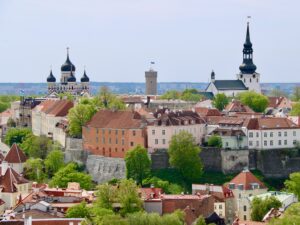
Go to Visit Tallinn for all the information you need about this picturesque medieval capital of Estonia, which dates back to 1154. In 2025, Tallinn has just over 450,000 inhabitants, a third of the entire country. Over the years, the city has fallen into the hands of the Danes, Germans and, most recently, the Russians. A remarkable fact is that in 1980, the Moscow Olympic Games were partly held in Tallinn, as sailing competitions were organised there. It was not until 1991 that Estonia finally broke away from the Soviet Union and became a sovereign country again, but a significant part of the population is still Russian.
Would you like to come too? Use the code SCA15 for a 15% discount and, until 26 September 2025, you will even receive an additional 30% discount thanks to Early Bird prices.
Here’s all the information you need:
Website: https://impactday.eu/
Programme: https://lnkd.in/eTCnAXxJ
Tickets: https://lnkd.in/eB9xMp9W
📢 Sustainability Content Agency is an ambassador of Impact Day and helps organizations with the writing, translating and editing of a wide range of materials related to sustainability (in all European languages). Simply send an email to info@sustainabilitycontentagency.com to discuss your requirements or book a short meeting via Calendly on this site.
Binnenkort Impact Day 2025 in Tallinn
Administrator1
Op 9 en 10 oktober is het weer tijd voor Impact Day in de prachtige oude stad Tallinn in Estland. Als je een keer iets anders wilt proberen, inspiratie wilt opdoen en daarnaast een leuke reis wilt maken, dan is dit een uitgelezen mogelijkheid.
Er wordt geen onderwerp op het gebied van duurzaamheid onbesproken gelaten, waaronder cleantech, natuur, voedingsindustrie, mobiliteit/transport, bouwen en sociaal ondernemen. Je kunt luisteren naar gerenommeerde sprekers als ondernemer en bestsellerauteur Seth Godin, klimaatactivist Clover Hogan (vorig jaar ook aanwezig), auteur en non-profit entrepreneur (Sensei) David Armstrong en vele anderen.
Het thema van dit jaar is Building a bold, self-sufficient Europe!
Impact Day is het grootste evenement in zijn soort in Noord-Europa en richt zich voornamelijk op het bevorderen van sociaal, verantwoord en milieuvriendelijk zakendoen, waarbij welzijn en welvaart hand in hand gaan.

De wereld gaat door een periode van instabiliteit en verandering, wat gepaard gaat met allerlei onzekerheden. Ook geopolitieke spanningen zorgen voor de noodzaak van een meer zelfvoorzienend en duurzaam Europees continent. Op dit evenement kun je in contact komen met en leren van leiders, innovators, beleidsmakers en maatschappelijke influencers, die allemaal streven naar positieve en duurzame actie. Je kunt genieten van meer dan 80 sessies, waaronder keynotes, praktische workshops, discussiepanels en zelfs een pitchcompetitie!
De grote vraag hierbij is: hoe kunnen we de huidige wereldwijde veiligheidscrises omzetten in kansen voor stabiliteit, terwijl we de overgang maken naar koolstofarme industrieën en een meer duurzaam levende samenleving? Je komt in contact met mensen die net als jij een strategische, gezamenlijke verschuiving willen om de noodzakelijke veranderingen mogelijk te maken.
Impact Day verhuist dit jaar van de vorige locatie de Põhjala Factory, naar een centraler gelegen en groter opgezette evenementruimte: Kultuurikatel (‘The Creative Hub’).

Ga naar Visit Tallinn voor alle informatie over deze pittoreske middeleeuwse hoofstad van Estland, die teruggaat tot maar liefst het jaar 1154. Tallinn telt nu in 2025 iets meer dan 450.000 inwoners, een derde van het hele land. De stad is in de loop der jaren in handen gevallen van de Denen, Duitsers en uiteraard meest recent de Russen. Een opmerkelijk feitje daarbij is dat in 1980 de Olympische Spelen van Moskou deels in Tallinn werden gehouden, aangezien er zeilwedstrijden werden georganiseerd. Pas in 1991 maakte Estland zich definitief los van de Sovjet-Unie en is het weer een soeverein land, maar een aanzienlijk deel van de bevolking is nog Russisch.
Wil je ook komen? Gebruik dan de code SCA15 voor 15% korting en tot en met 26 september 2025 komt daar zelfs nog 30% bovenop door Early Bird-prijzen.
Hieronder vind je alle informatie:
Website: https://impactday.eu/
Programma: https://lnkd.in/eTCnAXxJ
Toegangsbewijzen: https://lnkd.in/eB9xMp9W
📢 Sustainability Content Agency is ambassadeur van Impact Day en helpt organisaties bij het schrijven, vertalen en redigeren van allerlei materialen op het gebied van duurzaamheid (in alle Europese talen). Stuur gewoon een e-mail naar info@sustainabilitycontentagency.com om je wensen te bespreken of boek een korte meeting via Calendly op deze site.
How do you convey your message in a changing world?
Administrator1
Talking about the climate and making a personal contribution is no longer the preserve of a small group of people. In the past, they were called tree huggers or climate fanatics.
Nowadays, if you don’t have solar panels, you’re not really participating.
If you don’t eat vegetarian or vegan meals from time to time, you’re not really health-conscious.
If you don’t drive an electric car, you’ve really missed out.
If you only buy fast fashion, you’re not thinking things through.
If you read the above statements, which may be a bit exaggerated here and there, things are actually going quite well.
It starts with a shift in thinking. People inspiring each other. Even if it may not come entirely from within, things are moving.
The facts don’t lie. We can’t be truly positive about the climate, but approaching it with optimism is something to think about. Providing objective information is also important, without making people feel cornered. You’re dealing with ingrained habits.
Research shows that it’s actually not such a good idea to constantly show how vegan, environmentally conscious or impact-driven you are. It’s simply one of your unique selling points. You’re still mainly selling a product or service, not a climate benefit.
Want to communicate sustainability and social impact more effectively? At Sustainability Content Agency, we help you do just that, in almost all European languages.
Just send a message to info@sustainabilitycontentagency.com or book a quick 15-minute call via Calendly to discuss your needs.
Pictures by Andreas Kind (road in forest), Etienne Girardet (What is your story?) and Ava Sol (New empowering stories).
Hoe vertel je je boodschap in een veranderende wereld?
Administrator1
Praten over het klimaat en zelf een bijdrage leveren is al lang niet alleen maar voorbehouden aan een kleine groep mensen. Voorheen werden ze geitenwollensokkentypes of klimaatgekkies genoemd.
Als je nu geen zonnepanelen hebt, doe je eigenlijk niet mee.
Als je nu niet af en toe vegetarisch of veganistisch eet, ben je niet echt gezond bezig.
Als je nu niet elektrisch rijdt, heb je echt iets gemist.
Als je nu alleen nog maar fast fashion koopt, denk je niet helemaal goed na.
Als je bovenstaande stellingen leest, hier en daar misschien wat gechargeerd, zijn we eigenlijk best lekker bezig. Het begint met een shift in het denken. Mensen die elkaar aansteken. Ook al komt het misschien niet helemaal van binnenuit, dingen zijn wel in beweging.
Toch is het nog een beetje een bubbel. De zogeheten fanatiekelingen die er maar niet over ophouden. De klimaatspecialisten en -positievelingen of echte doemdenkers. De feiten liegen niet. Echt positief kunnen we niet zijn over het klimaat, maar dat je het optimistisch benadert, is wel iets om over na te denken. Objectief informeren ook, zonder dat mensen zich in een hoek gedrukt voelen. Je hebt te maken met ingesleten gewoontes. Niet gewend zijn aan kritisch denken.
Onderzoeken geven aan dat het helemaal niet zo’n goed idee is om continu te laten zien hoe vegan, milieubewust of impactgedreven je bent. Dat is internationaal, en heeft niets te maken met de Nederlandse nuchterheid. Het is simpelweg een van je unique selling points. Je verkoopt nog steeds vooral een product of dienst, geen klimaatvoordeel.
Het kost tijd. Iets wat de wereld niet heeft. Maar de overheid speelt ook een ontzettend belangrijke rol. Die kan veel meer bewustzijn creëren en strengere richtlijnen opstellen. Nu wordt internationaal in steeds meer steden het adverteren over vlees en fossiele brandstoffen in openbare ruimtes verboden. Dat zet waarschijnlijk echt zoden aan de dijk. In het schap met sandwiches bij de AH kon ik laatst kiezen uit 20 varianten, waarvan nog steeds maar 4 vegetarisch of veganistisch.
Door het ondertekenen van de Plant Based Treaty willen steden de uitbreiding van intensieve veehouderij tegengaan, plantaardige voeding actief promoten en ecosystemen verbeteren.
Dat is toch echt iets om positief over te zijn. Net als over evenementen als de Impact Fair in de Jaarbeurs in Utrecht en Plant FWD (grootste conferentie over alternatieve eiwitten in Europa) in Amsterdam, die allerlei initiatieven op dit vlak een podium geven.
Wil je je verhaal beter onder de aandacht brengen?
Sustainability Content Agency maakt duurzame content in bijna alle Europese talen en geeft online workshops in storytelling. Stuur even een berichtje naar info@sustainabilitycontentagency.com of boek een korte call van 15 minuten via Calendly om je wensen te bespreken.
Foto’s van Andreas Kind (weg in bos), Etienne Girardet (What is your story?) en Ava Sol (New empowering stories).

